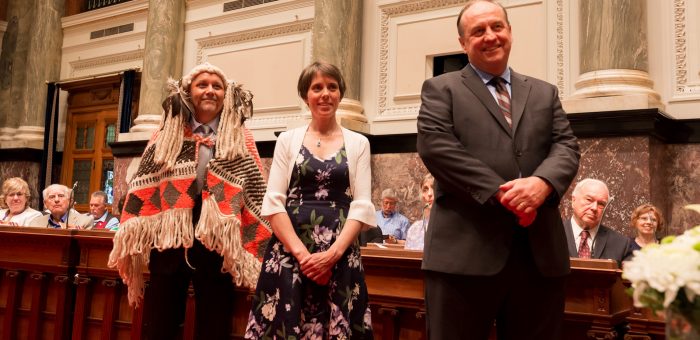Issues Blog
Bill M210 — Family Day Amendment Act, 2018
On February 9, the BC government announced that in 2019, Family Day would move from the second to the third Monday in February. In fact, I had earlier introduced a Private Member’s Bill in 2017 to do just this and so the BC Green caucus was thrilled that the BC NDP supported this BC Green initiative.
But such an announcement needs to be coupled with either a legislative or regulatory change. In light of the fact that it is now over a month since the announcement was made and that the act had yet to be changed either way, I felt it was important to reintroduce the bill to remind government of its commitment. As such yesterday I introduced, for the second time, the Family Day Amendment Act.
Below are the video and text of the bill’s introduction.
Video of Bill Introduction
Text of Bill Introduction
A. Weaver: I move that a bill intituled the Family Day Amendment Act, 2018, of which notice has been given in my name, be introduced and read a first time now.
This is the second time that I’m introducing this bill, which, if enacted, would amend the Family Day Act to prescribe that the third Monday in February each year is observed as Family Day. This amendment would align the date of B.C.’s Family Day with family days and other public holidays across the rest of Canada and in the United States.
The purpose of Family Day is to highlight the importance of family and bring families together, not cater to corporate lobbyists in the ski industry. In B.C., we observe Family Day a week earlier than all other provinces. Families spread out beyond B.C. aren’t able to be together. Federal employees and many who work in business are forced to work Family Day, since it is a business day everywhere else.
On February 9, the Premier announced that beginning 2019, Family Day would shift as outlined in this bill. Unfortunately, that cannot occur without a change in legislation. To assist government, I’m bringing forward this bill in the hope that the ball is not dropped. I would have brought this forward earlier had I realized we had such a light legislative agenda this session.
Mr. Speaker: The question is first reading of the bill.
Motion approved.
A. Weaver: I move that the bill be placed on the orders of the day for second reading at the next sitting of the House after today.
Bill M210, Family Day Amendment Act, 2018, introduced, read a first time and ordered to be placed on orders of the day for second reading at the next sitting of the House after today.
Reintroducing a bill to lower the voter age in British Columbia to 16
Today in the BC Legislature I reintroduced a bill that would lower the voter age in British Columbia to 16. This is the third time I’ve introduced this bill. I’ve provided a detailed rationale for it here, here and here, and expanded upon it further in a Vancouver Sun article that was published today.
Below I reproduce the video and text of my introduction of the bill, as well as the media statement that we released.
Video of Introduction
Text of Introduction
A. Weaver: It gives me great pleasure to introduce a bill that, if enacted, would lower the voting age to 16 in British Columbia.
The voting age in British Columbia was not always 18. Federally, it wasn’t until 1970 that the Canada Elections Act was amended to drop the voting age from 21 to 18. In British Columbia we made the jump in two steps. First, in 1952 we dropped the voting age from 21 to 19, but it wasn’t until 1992 that we made the subsequent change to lower the age to 18.
Around the world, more and more jurisdictions are openly discussing the notion of dropping the voting age to 16, and, in fact, a growing number have actually done so. Austria, Argentina, Brazil, Germany and Scotland are but a few of the jurisdictions that have extended voting rights to 16-year-olds.
There’s ample evidence to suggest that the earlier in life a voter casts their first ballot, the more likely they are to develop voting as a habit throughout their lifetime.
Sadly, in the 2017 election, only 56 percent of youth aged 18-24 and only 46 percent of young adults aged 25-34 voted here in British Columbia. Compare that to the provincial average of 61 percent and to the 75 percent of seniors aged 65-74 who voted.
It’s also a common misconception that 16-years-old are not as informed and engaged in political issues as older voters. The research, however, says otherwise.
Sixteen- and 17-year-olds are old enough to drive, pay taxes, get married and sign up for the military. They should have a say in the direction our province is heading as they ultimately inherit what we leave behind.
Mr. Speaker: The question is first reading of the bill.
Motion approved.
A. Weaver: I move that the bill be placed on the orders of the day for second reading at the next sitting of the House after today.
Bill M205, Election Amendment Act, 2018, introduced, read a first time and ordered to be placed on orders of the day for second reading at the next sitting of the House after today.
Media Release
Weaver re-introduces bill to extend voting rights to 16 and 17-year olds
For immediate release
March 13, 2018
VICTORIA, B.C. – Andrew Weaver, leader of the B.C. Green Party, introduced a Private Member’s bill to lower the voting age to 16 in B.C. This is the third time Weaver has introduced the bill.
“Young British Columbians have the greatest stake in the future of our province; they should have a say in the decisions our politicians make,” said Weaver.
“Yesterday, Elections B.C. announced that only 56.24% of 18-24 year olds and 46.35% of 25-35 year olds voted in our last provincial election. Voting rights have been extended to 16 year-olds in Scotland, Argentina, Austria and Brazil. Evidence from those jurisdictions shows that enfranchising these young voters has led to substantially higher levels of political participation.
“Moreover, research shows that the cognitive skills required to make calm, logically informed decisions are firmly in place by age 16. Young citizens of British Columbia are old enough to drive, pay taxes and sign up for the military. They are also the leaders of tomorrow. They should have a say in the direction we are heading, as they will inherit what we leave behind. B.C. should take this chance to strengthen our democracy and lower the voting age to 16.”
-30-
Media contact
Jillian Oliver, Press Secretary
+1 778-650-0597 | jillian.oliver@leg.bc.ca
Wondering why zero emission vehicles aren’t exempt from the PST surtax
Yesterday during committee stage of Bill 2: Budget Measures Implementation Act, 2018 I rose to ask the Minister of Finance why her ministry did not exempt zero emission vehicles from the PST surtax that they are now applying to higher end cars. As I note in the text and video exchange reproduced below, early adopters of new technology typically heavily subsidize the research and development (R and D) costs of such technology. These early adopters play a critical role in ensuring that new innovations ultimately become affordable for mainstream society.
In my opinion, zero emission vehicles should have been exempted from this surtax.
Text of Exchange
A. Weaver: The question I have for this section, I’ll ask it once and not repeat it for the other sections. It’s with respect to different types of classes of vehicles. I recognize that the minister had outlined the existing legislation and the taxes that apply below $125,000.
My question to the minister is this. To preface it, it’s that we know, in certain sectors, that early adopters are the ones that pay the R and D for new technology to emerge. If we go and look at flat screen televisions, the people who bought the first flat screens paid thousands and thousands of dollars. Now they’re literally giving them away when you sign deals — left, right and centre.
My question is: did the minister or her staff not think about exempting hydrogen fuel cell electric vehicles from this tax? That is, with recognition that it is those early adopters that are paying the R and D in this new and emerging technology that allows others to actually buy these technologies, which is a direction we want to go.
So my question is: why did the ministers not exempt zero-emission vehicles from this additional PST? Ultimately, we want to tax that which we don’t want, and we want to not tax that which we do want. These are zero-emitting vehicles.
Hon. C. James: Thank you to the member for the question. In fact, we did take a look at battery-electric vehicles available in British Columbia. We did look at prices. The member is quite right. It’s obviously an area we want to incent support for.
If you take a look…. I’ll just give you some prices of the base models. I recognize that there are models that could be much more extreme than this. But if you look at the base models, for example, of Teslas — a Model 3 or Model S or Model X — those are all under $125,000. We feel that that fits within the existing bill.
A Nissan LEAF, for example, is $35,000; a Fortwo electric drive, $29,000. If you take a look at the prices — a BMW i3 is $50,000 — they’re all well within the range and under the $125,000. We felt that that was a reasonable approach and didn’t penalize, as the member has suggested, the kind of behaviour that we want to incent.
A. Weaver: Just to follow up, though. In fact, as the technologies emerge…. You couldn’t buy a hydrogen fuel cell. We don’t know whether that’s going to be the technology of tomorrow. But suppose a company decides to put that on the market. It’s zero-emitting. We don’t know that that…. We would want to let the early adopters actually pay the price, if they want to have that niche article, and not tax them.
In addition, we’re now talking about driverless vehicles. The high-end Teslas…. The Model X actually has a driverless component to it, and to get $125,000…. It goes rather quickly, and also the other exemptions for above 50 and above 67 too.
Again, I recognize the minister says that they took a look at the cars. But the reality is that the reason why we can buy a Nissan LEAF now for $35,000 is precisely because people were willing to pay $100,000 plus for those Teslas, and you got the investment in the battery technology that led to the mass production of the smaller cars.
Again, I would hope that the minister would recognize that this has been viewed very negatively within the electric vehicle sector of our society because of the fact that it’s not differentiating between those cars that pollute and those cars that don’t. It’s being viewed simply as a punitive measure on those early adopters who are trying to actually get the market going in the direction they wish it to go.
Hon. C. James: Thanks to the member. I appreciate that. But again, when we’re taking a look at an increase in the purchase price of vehicles over $125,000 and over $150,000, I think that’s a reasonable approach. It doesn’t mean that those won’t be adjusted over time as additional vehicles come on the market.
I certainly know that most companies are looking at, when they get their vehicles on the market, as much affordability as they can. There are certainly other incentives that are often offered, whether it’s a rebate for an electric vehicle or otherwise. There are other kinds of rebates that occur as well.
We felt that this was a fair process. As I said, when I take a look at the models that are on the market, I think even Tesla…. When you’re looking at $122,600, that’s still a fairly pricey vehicle. We think $150,000 and $125,000 are a reasonable approach.
But I take the member’s point and understand that, always, there are opportunities to go back and take a look, as I said earlier, at a number of taxes we’ve talked about. There are always opportunities at the end of each year to take a look at their impact, to take a look at whether they’ve been effective or not and adjust as may or may not be needed.
Video of Exchange
Where’s the legislative agenda? Another miscellaneous statutes amendment act!
Today in the BC Legislature we debated at second reading Bill 7: Miscellaneous Statues Amendment Act, 2018. Such miscellaneous statute amendment bills are considered house keeping bills that contain numerous minor changes to several existing pieces of legislation. Typically these changes emerge as clarifications prompted from questions that have arisen in interpreting existing legislation.
Such bills are common. But what concerns me is that we are now half way through this legislative session and the government has yet to introduce any substantive new legislation. I was hoping for much more. The BC Greens would be thrilled to implement our ideas if the government is at a loss as to what should be done.
Below I reproduce the video and text of my brief speech.
Video of Speech
Text of Speech
A. Weaver: I rise with great pleasure to speak to Bill 7, the Miscellaneous Statutes Amendment Act. These are typically acts that we don’t debate very often, hon. Speaker, as you will know, as they’re housekeeping acts — acts that typically have highlighted a number of problems that have arisen, and legal challenges, etc., through the years.
In this particular case, we’re fixing a few things in the Interpretation Act — important things, defining where a time starts and ends for various measures — and little additions to the Crown Proceeding Act, as well as the Cooperative Association Act, the Building Act, the Fire Services Act and, of course, the Ministry of Provincial Secretary and Government Services Act.
Now, obviously, I speak in support of these changes. These changes are the culmination of a lot of hard work done by civil service legislative drafters, trying to ensure that our bills and laws are as up to date, as succinct and clear and easy to interpret as possible.
But on the broader question…. The broader question is really this. We are now halfway through this session. We are going to end at the end of this week. As it stands, the members of the opposition have brought in more bills to debate than has government.
In fact, the government has only brought in four bills. What is government doing?
We’re here to debate the Miscellaneous Statutes Amendment Act. When I sat on the other side, I used to listen to member after member in the opposition then and now government hurl abuse at the B.C. Liberals — abuse about the fact that all we were debating was miscellaneous statutes amendments acts. Sometimes, there were three such acts. Here we now have a government that’s been in power for nearly eight months, and what are we debating? We’re debating Bill 7, Miscellaneous Statutes Amendment Act.
Where’s the Family Day amendment act? We know that the Premier has stood up and said that Family Day is going to change. It’s one line that needs to change in that act. Why aren’t we debating that? We had the members opposite, when they were in opposition, bringing in bill after bill after bill for years. Where are all of those bills?
Obviously, I stand in support of this, as both sides stood in support of the Supply Act to ensure that the government was paid, but really, this is not good enough. Government has been in power for eight months, and this is the level of our debate here. Frankly, I’m tired of it, and British Columbians are tired of it. I think that we need to shape up here in British Columbia and ensure that we’re actually debating legislation about the issues that British Columbians care about.
With that, hon. Speaker, I thank you for your time, and I look forward to finally debating some other bills that we hope, at some point, will actually be brought forward to this Legislature.
Attempting to get clarity on the BC NDP “Speculation” Tax
Today in Question Period I took the opportunity to see if I could get more details from the Minister of Finance on the BC NDP’s so-called “Speculation Tax”.
Last week I was very critical of the way the BC NDP introduced this tax. Ironically it doesn’t even address speculation in the real estate sector.
I remain unconvinced that the BC NDP know what outcome they are trying to achieve with their tax measure. It’s clear to me from the Minister’s responses to my questions (reproduced in video and text below) that they don’t understand the difference between a vacancy tax and a speculation tax. In fact, under the Vancouver Charter, that city have already imposed a vacancy tax.
A better way forward would be to enable all local governments (not just Vancouver) to introduce vacancy taxes if they felt it was in their community’s interest. At the same time, a speculation tax could be applied exclusively to properties owned by offshore individuals and entities, the bare trust loophole could be closed and a flipping tax could be applied when the same property is sold multiple times in a short time period.
Fortunately there is still time to fix what the BC NDP have proposed.
Video of Exchange
Question
A. Weaver: There’s no doubt that we need to take bold action to address the drivers in our housing crisis. A fundamental component of this is clamping down on speculation. But the government’s botched speculation tax doesn’t in fact target speculation.
A speculator is someone who buys a property solely to flip it. A speculator is someone who parks offshore money in our real estate, hoping to protect themselves from the turmoil in global markets. A speculator is someone who uses bare trusts to avoid paying property transfer taxes, thereby allowing multiple sales and resales with no change in title.
A speculator is not someone who pays taxes here and owns a vacation cottage. These folk are not trying to capitalize on our out-of-control housing market.
My question to the Minister of Finance is this. The minister has said that her aim is to make sure she gets speculators out of the market. Does the minister consider British Columbians with vacation homes to be speculators? Or will she ensure that they are fully exempt from this tax? If so, how will she do it?
Answer
Hon. C. James: Thank you to the member, the Leader of the Third Party. I appreciate the question, and I appreciate his support for a speculation tax.
We were left, in this province, with a crisis when it comes to the housing market, because the other side ignored the issues and the crisis that people were facing around affordability. We’ve seen rents skyrocket. We’ve seen families who can’t afford to live in the community that they work in. So our goal is to ensure that British Columbians can afford to work and live in their own province.
We’re including measures in the speculation tax that will protect British Columbians. We are looking at getting people out of the market who are using our housing market as a stock market. The specifics will come. We’re continuing to listen to the issues that people raise, including the member at the end. We will make sure that housing is affordable for British Columbians. That’s our aim, and that’s what the speculation tax will do.
Supplementary Question
A. Weaver: The government has had years to consult with British Columbians. Instead, it brings in a poorly thought out tax measure whose interpretation seems to change every time the minister or Premier is in a press scrum.
As far as I can understand from the tax information sheet still on the government’s website, British Columbians with second homes have to pay the tax, and then they get a non-refundable tax credit after the fact. Low or moderate-income British Columbians will, in many cases, not even be able to use the tax credit. But if you’re very wealthy, you get the full benefit of the credit. That doesn’t make any sense. It penalizes people with moderate and low incomes and further entrenches the idea that home ownership is reserved only for the wealthiest.
Hon. Speaker, my question, through you to the Minister of Finance, is this: will the minister reconsider this tax credit model to ensure that British Columbians with vacation homes are actually protected from the effects of this speculation tax?
Answer
Hon. C. James: I would say to the member, once again, that we introduced the speculation tax as part of our 30-point plan to address affordable housing in British Columbia. I said in the budget lockup and on budget day that the details would be coming. We are listening to British Columbians, including the member and other people who have put forward ideas. We have been working on those issues since we introduced the speculation tax.
The specific concerns that the member raises are issues that are already on the table, which we are reviewing and looking at as we implement the tax. As I’ve said all along, details will come. The aim is to make sure that we get speculators out of the market.
I would say to the member that if you are an individual who owns four empty houses and you’re leaving them vacant in Vancouver, you are speculating in the housing market. We will be addressing that, and we will be addressing affordable housing for British Columbians.








